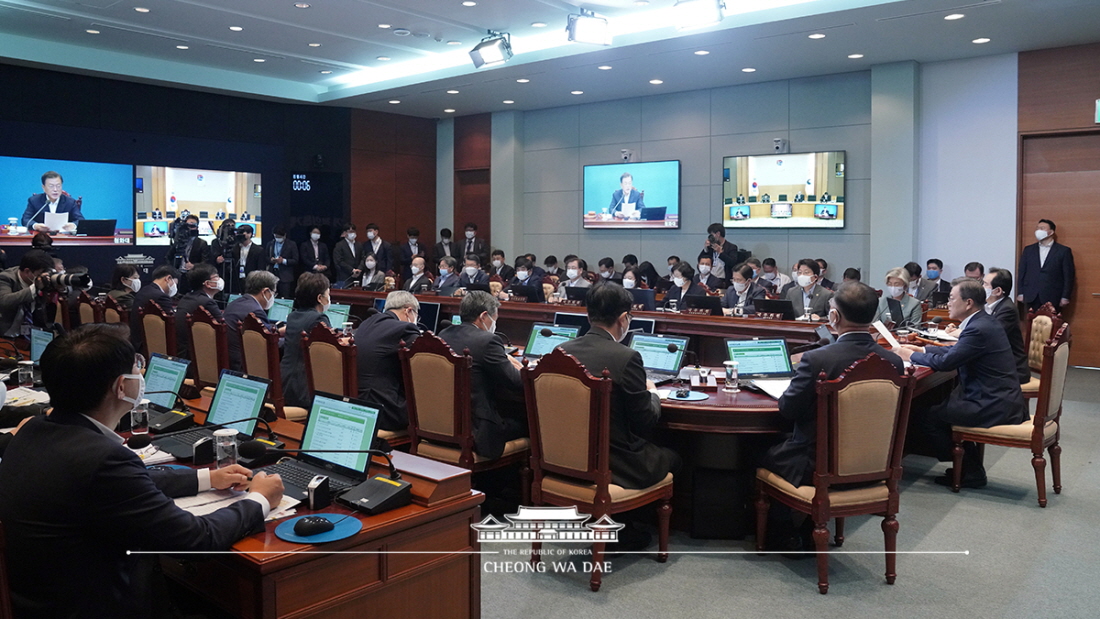이 웹사이트는 제19대 대통령 임기 종료에 따라 대통령기록관이 「대통령기록물 관리에 관한 법률」에 의해 이관받아 서비스하는 대통령기록물입니다. 자료의 열람만 가능하며 수정 · 추가 · 삭제는 불가능합니다.
다만, 「개인정보보호법」에 의하여 개인의 정보를 보호받기 원하시는 분은 관련 내용(요청자, 요청내용, 연락처, 글위치)을 대통령 웹기록물 담당자(044-211-2253)에게 요청해 주시면 신속히 검토하여 조치해 드리겠습니다. 감사합니다.
SPEECHES & REMARKS
BRIEFINGS

Let me begin the 35th Cabinet Meeting.
Representatives from labor, management and the Government reached a tentative agreement at the meeting convened to help overcome the COVID-19 crisis, but they failed to arrive at a final deal due to the Korean Confederation of Trade Unions’ last-minute absence at the signing ceremony. I find it very regrettable, indeed. If the agreement had been signed, it could have become an important first step toward a grand social compromise. However, I believe the fact that the representatives of the three groups reached a provisional agreement after engaging in long discussions and making small concessions is itself significant progress and a considerable achievement.
What the tentative agreement does contain is the intention of labor, management and the Government to share and overcome difficulties amidst the COVID-19 crisis. Together with the Government’s efforts to protect jobs and businesses, it reflects labor and management’s determination to share suffering and work together for mutual benefits. Also within the agreement is an expansion of the social safety net to avoid taking the same ill-fated path that has led to worsening inequality in the process of surmounting a crisis. Part of the agreement is a plan to improve programs to strengthen the national epidemic prevention and control system and expand the infrastructure for public healthcare to provide medical personnel with better treatment and additional manpower.
We must continue to actively draw on the spirit contained in the agreement. I hope the Economic, Social and Labor Council will pick up the items discussed in the tentative agreement and complete the social agreement. I also look forward to the Korean Confederation of Trade Unions never letting go of the possibility of cooperation.
The Government will live up to the spirit of this agreement by implementing it to the full degree. A maximum 90-percent subsidy for retaining jobs will be provided for three extra months through an additional 500 billion won. These funds have already been included in the third supplementary budget.
Going forward, the Government will do all it can to support employment retention and the survival of businesses as stipulated in the tentative agreement. We’ll also prepare a roadmap to eliminate employment insurance blind spots by the end of the year.
Labor-management relations should also develop in line with changes in the new era. As the world is undergoing a great transition into the digital era, the forms of labor are changing significantly. Nonconventional labor and jobs – freelancers, the contract-based self-employed and platform workers – have rapidly expanded and are already deeply embedded in our society. Our push for “universal employment insurance” also reflects these changing trends. This is what labor, management and the Government all expressed mutual understanding about and concurred on during the recent consultations. In line with the changing circumstances, we now have to depart from the confrontational labor-management relations which marked the past industrialization era. Along with the efforts to actively embrace changes in labor, we should move toward new labor-management relations that pursue mutually beneficial cooperation. A culture of mutual benefit and cooperation is all the more urgent – particularly in times of crisis. Accomplishing a grand compromise by mutual concessions is the way to rescue the country from a crisis and save everyone.
A recent incident of violence in the sports community is causing immense public resentment. It’s truly regrettable and heartbreaking that an athlete, who should be loved by everyone, chose to take her own life. I pray for the repose of her soul and extend my deepest condolences to her bereaved relatives.
Cruel treatment and acts of violence against athletes are vestiges of the old era and can never be justified. Those in the sports community should break away from such outdated and backward behavior that has lingered as bad practices.
Perception and social practices have to change first. A medal is not the most valuable thing. Records are not as important as the happiness of athletes. Athletes should be able to enjoy competition. The beads of sweat that athletes shed trying to improve their performance are beautiful. However, if cruel treatment and violent acts are part of training, the medal itself becomes worthless.
This kind of unfortunate incident should never be repeated. Perpetrators should be given proper punishment and be held responsible by thorough investigation. The victim reportedly asked for help from the police, the Korea Triathlon Federation, the Korean Sports and Olympic Committee and Gyeongju City, but she could not receive appropriate assistance anywhere. If it is true, this is an issue that must be scrutinized without fail. No matter how plausible the law and systems to protect the rights of athletes appear, they are useless if they do not work on the field. I ask related ministries and agencies – together with those involved in the sports community – to quickly come up with an effective measure to prevent further instances from occurring through rigorous investigation. In addition, I also ask you to broadly look into whether there are any similar incidents.



